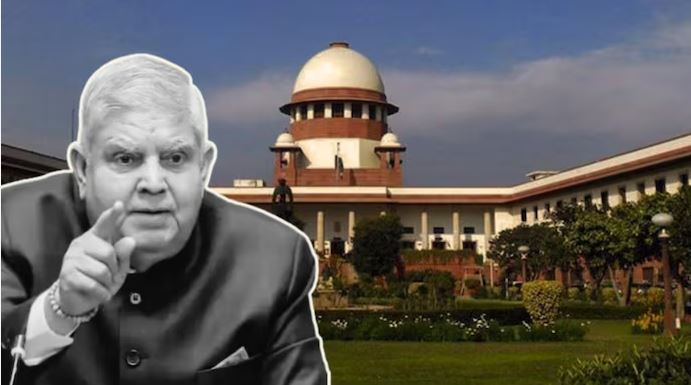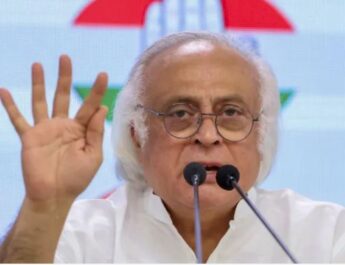New Delhi: Vice President Jagdeep Dhankhar on Thursday expressed his disapproval of a Supreme Court of India ruling that established a deadline for the President to approve bills passed by state legislatures. He was referencing the April 8 ruling in the case of Tamil Nadu versus the governor, which was perceived as a victory for states throughout India.
This ruling mandated a specific timeframe for the President to provide assent to bills that had been reserved for her consideration by state Governors.
In his critique of the decision to impose a timeline on the President regarding the signing of state-passed bills, Dhankhar called for greater accountability within the judiciary. He characterized Article 142 of the Indian Constitution as a “nuclear missile against democratic forces” that is perpetually accessible to the judiciary.
What is Article 142?
Article 142 of the Indian Constitution stipulates that “The Supreme Court in the exercise of its jurisdiction may pass such decree or make such order as is necessary for doing complete justice in any cause or matter pending before it.”
This provision grants the Supreme Court the discretionary authority to issue any order or render any judgment it deems essential to ensure complete justice in any case before it, often referred to as the Supreme Court’s “plenary power.”
Additionally, the article empowers the Supreme Court with “all and every power” necessary to compel an individual to appear in court, to facilitate the discovery or production of documents, or to impose penalties for contempt of court.
What did Vice President Jagdeep Dhankhar state?
While addressing the sixth group of Rajya Sabha interns on Thursday, Vice President Jagdeep Dhankhar raised concerns about the Supreme Court functioning as a “super Parliament.”
He emphasized the need for judicial accountability, stating, “We have judges who legislate, perform executive functions, and act as a super Parliament, yet they remain completely unaccountable because the law of the land does not apply to them.”
In response to the judgment delivered on April 8, Dhankar voiced his dissatisfaction regarding a directive issued to the President of India. He remarked, “A recent ruling has directed the president. Where are we headed? What is transpiring in our nation? We must exercise extreme caution. This is not merely about someone seeking a review. We did not envision democracy leading us to this point. The President is being urged to make decisions within a specified timeframe, failing which it becomes law.”
“We cannot accept a scenario where directives are issued to the President of India, and on what grounds? The sole authority granted to you under the Constitution is to interpret it as per Article 145(3),” he continued.
A significant concern raised by Dhankar was the encroachment of powers among the three branches of democracy, which he deemed detrimental. “The time has come for our three institutions—the legislature, judiciary, and executive—to thrive independently. Any intrusion by one into the domain of another presents a challenge that is undesirable.”
Dhankar further stated that while the government is accountable to both Parliament and the citizens of India, if the judiciary assumes executive functions, accountability becomes problematic. “When the government is elected by the populace, it is answerable to Parliament and the electorate during elections. There exists a principle of accountability. In Parliament, one can pose questions, including critical inquiries, because governance is conducted by the executive. However, if governance is assumed by the judiciary, how can questions be raised?” he questioned.
Criticism of Jagdeep Dhankar’s statements
Criticism of Jagdeep Dhankar’s statements came from Rajya Sabha member Kapil Sibal, who labeled Dhankar’s comments on the judiciary as “non-neutral” and “unconstitutional.” On Friday, Sibal stated, “Such statements may give the impression that the judiciary is being reprimanded. It is neither neutral nor constitutional.”
He further remarked that he has never witnessed a Rajya Chairman making political comments of this kind. “I hold him in high regard, but you referred to Article 142 as nuclear missile material; how can you make such a statement? Article 142 empowers the Supreme Court, and this authority is granted by the Constitution, not by the government. It is intended to ensure complete justice,” he stated.
Congress leader and MP Randeep Singh Surjewala also expressed his respectful disagreement with Dhankhar’s remarks, asserting that the Supreme Court’s ruling was essential. In a post on X (formerly Twitter), Surjewala stated, “The Supreme Court’s judgment, which imposes constitutional limitations on the powers of Governors and the President of India, is timely, accurate, courageous, and rectifies the misconception that those in high office are exempt from any constraints or checks and balances in the exercise of their authority.”
“Judicial independence is indeed a ‘nuclear missile’ (to borrow the Honorable Vice President’s terminology) aimed at combating injustice, arbitrariness, inequity, usurpation, and the assumption of power that undermines the Constitution, while also safeguarding the rights of the populace against the arbitrary actions and decisions of those in authority,” he added.




